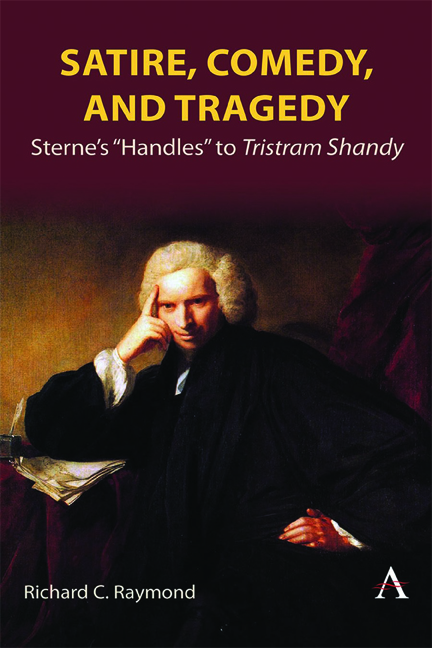Book contents
- Frontmatter
- Contents
- Preface
- 1 Walter, Toby, Tristram, and the Reader: Sterne’s Revision of “Dullness”
- 2 The Yorick Standard, Walter’s Benevolent Dullness, and Tristram’s Friends: The Plot of Satire in Tristram Shandy
- 3 “True Shandeism”: The Unhappy Comic Action in Tristram Shandy
- 4 Isolation and Death: The Tragic Undertones of Shandean Benevolent Dullness
- 5 Benevolent Dullness, Ambiguity, and the Reader: Modal Complexity and the Plots of Tristram Shandy
- 6 Laurence Sterne’s Letters
- 7 The Shandean Sermons of Parson Sterne
- 8 Parson Yorick in A Sentimental Journey and in A Continuation of Bramine’s Journal
- 9 The International Perspective on Tristram Shandy and the Argument
- References
- Index
6 - Laurence Sterne’s Letters
Published online by Cambridge University Press: 01 March 2024
- Frontmatter
- Contents
- Preface
- 1 Walter, Toby, Tristram, and the Reader: Sterne’s Revision of “Dullness”
- 2 The Yorick Standard, Walter’s Benevolent Dullness, and Tristram’s Friends: The Plot of Satire in Tristram Shandy
- 3 “True Shandeism”: The Unhappy Comic Action in Tristram Shandy
- 4 Isolation and Death: The Tragic Undertones of Shandean Benevolent Dullness
- 5 Benevolent Dullness, Ambiguity, and the Reader: Modal Complexity and the Plots of Tristram Shandy
- 6 Laurence Sterne’s Letters
- 7 The Shandean Sermons of Parson Sterne
- 8 Parson Yorick in A Sentimental Journey and in A Continuation of Bramine’s Journal
- 9 The International Perspective on Tristram Shandy and the Argument
- References
- Index
Summary
In a letter written in 1767, one year before his death, Laurence Sterne describes himself as a “sentimental being” but assures his anonymous aristocratic friend that he counts himself as no ineffectual, scatter-brained Shandy. “The world has imagined,” Sterne explains to the earl, that “because I wrote Tristram Shandy I was myself more Shandean than I really was.”
We must acknowledge Sterne's disclaimer here when we contrast his sales to those of Tristram, who laments the “ten cart loads” of unsold volumes (8: 663) and receives no recognition in Paris (7: 599). In contrast to such failure and anonymity, in a 1762 letter to the famous actor David Garrick, Sterne writes of the “unexpected honours” he received in France, boasting that he has, unlike Tristram, converted many French readers “unto Shandeism” (Letter 81: 224; Letter 84: 242). Indeed, in his 1765 letter to Robert Foley, Sterne admits receiving, unlike Tristram, a “considerable sum” from sales of Tristram Shandy (Letter 147: 409), and Sterne's letter to Thomas Becket in the same year describes gratifying sales (Letter 89: 261).
Yet despite this contrast between the author's success and the surrogate's failure as well as Sterne's denial of Shandean kinship, Sterne shares Tristram's authorial experiences and motives. We have already seen in Tristram Shandy itself that Sterne and Tristram have accepted the inevitable persecution that comes to wit and the inevitable death that comes to humanity, and that, their tragic resignation notwithstanding, both authors have committed themselves to writing for friendship and against dullness. Sterne's letters reflect this same Shandean resignation and commitment.
Sterne's Epistolary Rebukes of Moralistic Dullness
Even though Tristram Shandy became immediately fashionable, Sterne, like Tristram, received numerous rebukes from the “grave” moralists. In a 1760 letter to Garrick, Sterne speaks of the “wound” he received from the rumor that he intended to lampoon William Warburton as Tristram's tutor. Such a report, says Sterne, mirrors the kind of “malice” that “brought poor Yorick to his grave” (Letter 46: 123). In that same year, Sterne confesses in a post-script to a letter addressed to Warburton that “the scribblers’ use me ill” (Letter 59: 152); Sterne was also accused of slandering Dr. Mead in his portrait of the pompous Dr. Kunastrokius (Letter 45: 125). Reiterating
- Type
- Chapter
- Information
- Satire, Comedy and TragedySterne's 'Handles' to <i>Tristram Shandy</i>, pp. 117 - 124Publisher: Anthem PressPrint publication year: 2023



